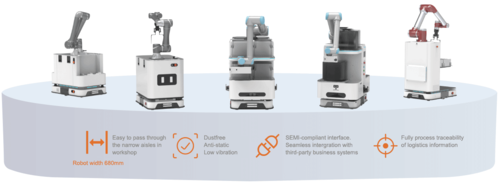© © 2025 Copyright © Youibot Robotics Co., Ltd. All rights reserved.SitemapPrivacy Policy
In the ever-evolving landscape of manufacturing, smart technologies are revolutionizing traditional processes. One such innovation that has gained prominence is the integration of autonomous mobile robots (AMRs) into manufacturing facilities. These robots, equipped with advanced sensors and artificial intelligence (AI), offer a myriad of benefits, driving operational excellence and efficiency across various industries.
AMRs enhance operational agility by streamlining material handling tasks. Traditionally, material transportation within manufacturing facilities often involves manual labor or fixed conveyor systems, which can be rigid and inefficient. AMRs offer a flexible and adaptable solution. They autonomously navigate complex environments, avoiding obstacles, and dynamically adjusting their routes to optimize efficiency. By automating material transport, AMRs minimize idle time, reduce lead times, and enhance overall productivity.

AMRs contribute to improved safety within manufacturing environments. In traditional setups, workers may be exposed to hazardous conditions during material handling tasks, leading to safety concerns and potential accidents. With AMRs taking over repetitive and physically demanding tasks, human workers can be redeployed to more strategic roles, reducing the risk of injuries and creating a safer work environment. Additionally, AMRs are equipped with advanced sensors and collision avoidance systems, further mitigating the risk of accidents and ensuring safe operations.
AMRs enable real-time data collection and analysis, facilitating data-driven decision-making in manufacturing operations. Equipped with sensors and IoT connectivity, these robots gather valuable data throughout the production process. By analyzing this data, manufacturers gain insights into key performance metrics such as cycle times, throughput, and equipment utilization. This data-driven approach enables proactive maintenance, optimized production schedules, and continuous improvement initiatives, ultimately driving operational excellence and enhancing competitiveness.
AMRs offer scalability and flexibility, making them suitable for a wide range of manufacturing applications. Whether in automotive assembly lines, electronics manufacturing, or warehouse logistics, AMRs can adapt to diverse tasks and environments. Their modular design allows for easy integration with existing infrastructure and workflows, minimizing disruption and facilitating rapid deployment. Moreover, as manufacturing requirements evolve, AMRs can be reprogrammed and redeployed to accommodate changing production needs, ensuring long-term scalability and agility.
Despite their numerous advantages, successful integration of AMRs requires careful planning and implementation. Manufacturers must assess their specific operational challenges and identify areas where AMRs can deliver the greatest value. Additionally, proper infrastructure and connectivity must be in place to support seamless integration with existing systems. Comprehensive training programs should be provided to ensure that employees are comfortable working alongside autonomous robots and understand how to leverage their capabilities effectively.
Autonomous mobile robots represent a transformative technology that holds immense potential for enhancing operational excellence in manufacturing. By automating material handling tasks, improving safety, enabling real-time data insights, and offering scalability and flexibility, AMRs are driving efficiency and agility across manufacturing industries. However, successful adoption requires strategic planning, infrastructure readiness, and employee training. With the right approach, manufacturers can harness the power of AMRs to achieve new levels of productivity and competitiveness in the era of smart manufacturing.
By continuing to use the site you agree to our privacy policy Terms and Conditions.